home > Books by FW Boreham > 1920, A Bunch of Everlastings > William Cowper’s Text
William Cowper’s Text
I
HAVE a good look at him, this shy, shuddering, frail little fellow of six, for rough hands are waiting to hustle him on to the coach and to pack him off to a distant boarding-school ! He is a quivering little bundle of nerves; slight of figure; with pale, pinched face, and eyes swollen with chronic inflammation. He starts at every sound in the daytime, and throws the bedclothes over his head at night that he may not be scared to death by the ghostly shadows that flit across the wall. His mother, his sole source of comfort, has just died : that is why he is being sent away from home. The memory of her was ever afterwards the one star that illuminated his dark sky. Late in his life, a picture of her was presented to him ; and his ecstasy knew no bounds. ‘The world,’ he wrote to the giver, ‘could not have furnished you with a present so acceptable to me as the picture which you have so kindly sent me. I received it the night before last, and received it with a trepidation of nerves and spirits somewhat akin to what I should have felt had its dear original presented herself to my embrace. I kissed it and hung it where it is the last object which I see at night, and the first on which I open my eyes in the morning. Her memory is to me dear beyond expression.’ And then, turning to the picture itself, he breaks into poetry :
Oh, that those lips had language! Life has passed
With me but roughly since I heard thee last.
Those lips are thine — thy own sweet smile I see,
The same that oft in childhood solaced me.
My mother, when I learn’d that thou wast dead,
Say, wast thou conscious of the tears I shed?
Perhaps thou gav’st me, though unfelt, a kiss;
Perhaps a tear, if souls can weep in bliss.
I heard the bell toll’d on thy burial day;
I saw the hearse that bore thee slow away.
Thy maidens, grieved themselves at my concern,
Oft gave me promise of thy quick return.
Thus many a sad to-morrow came and went,
Till, all my stock of infant sorrow spent,
I learn’d at last submission to my lot,
But, though I less deplored thee, ne’er forgot !
So his mother dies and leaves him — a queer, unwelcome heritage — to his father. And his father, utterly bewildered by the boy’s odd fancies and erratic ways, has resolved to get out of the difficulty by banishing him to a boarding-school. At the boarding-school he is badgered and bullied and beaten without respite and without mercy; and to the last day of his life he never thinks of the horrid place without a shudder.
Have a good look at him, I say, before they bundle him into the cavernous interior of the old coach. For, in spite of everything, this little parcel of timid, quivering sensibility is going to make history. It frequently happens that, when a man drops into his grave, his fame gradually subsides until his memory entirely perishes. With Cowper a diametrically opposite principle has been at work. More than a cen- tury has elapsed since he quitted the scene of his labours; and during that period the lustre of his fame has steadily grown. Time was when it was the fashion to pooh-pooh the claims of Cowper. ‘Did he not,’ it was asked contemptuously, ‘did he not on several occasions attempt suicide and spend much of his time in a mad-house?’ This, of course, is indisputable; but it is also true that almost any young fellow of nervous temperament and frail con- stitution would lose his reason, and seek some violent means of escape from the horrors of life, if his malady were treated as it was customary to treat such cases a century and a half ago. The marvel is that from so frail a personality, so pitilessly treated, we have inherited poetry that will be cherished as long as the language lasts.
II
It is the glory of Cowper that he stands among our pioneers. England had wrapped herself in gloomy and sullen silence. Literary genius seemed dead. Then, all at once, the country became like a grove at sunrise. And the first note heard was the note of William Cowper. Dr. Arnold, in talking to his boys at Rugby, used to call him ‘the singer of the dawn.’ Goldwin Smith declares that he is the most important poet between the time of Pope and the time of Wordsworth. In one of his best essays, Macaulay says that Byron contributed more than any other writer, more even than Sir Walter Scott, to the literary brilliance of the period; and he is careful to emphasize the fact that it was Cowper who called that fruitful era into being. ‘Cowper,’ he says, ‘was the forerunner of the great restoration of our literature ;’ and a little further on he declares that, ‘during the twenty years which followed the death of Cowper, the revolution in English poetry was fully consummated.’ So there he stands, holding, and holding for all time, a place peculiarly his own in our British life and letters. He is an attractive, if a somewhat depressing, figure. A feeble, sensitive and highly-strung physique; a mental wreck; a would-be suicide; a passionate lover of all forms of animal life; the author of some of our quaintest humour and some of our most sacred hymns; his life was, as Byron expressively said, a singular pendulum, swinging ever between a smile and a tear. Few poets are more human, more sim- ple, more unaffected, more restful than he ; few are more easy to read. His ‘John Gilpin,’ his ‘Alexander Selkirk,’ his ‘Boadicea,’ and ‘My Mother’s Picture’ were among the first poems we learned in our school-books; some of his verses will be among the last we shall care to remember. Perhaps his most force-ful and pathetic epitaph was written by Mrs. Browning, in words as true as they are sorrowful : —
O poets, from a maniac’s tongue was poured the deathless singing !
O Christians, at your cross of hope a hopeless hand was clinging !
O men, this man in brotherhood your weary paths beguiling.
Groaned inly while he taught you peace, and died while you were smiling!
III
But it is time that we asked ourselves a question. What was it that so distracted this sensitive brain? What was it that almost broke this gentle and clinging spirit ? What was it that again and again drove Cowper to attempt his own destruction? There is only one answer. It was his sin, ‘My sin; my sin!’ he cries from morning till night, and, very often, from night until morning. ‘Oh, for some fountain open for sin and uncleanness !’ But he can find no such fountain anywhere. He is like the old lama, in Kipling’s Kim, who was continually searching for the River, the River of the Arrow, the River that can cleanse from sin! But, like the lama, he can nowhere find those purifying waters. And because his frenzied quest is so fruitless and so hopeless, he seeks relief in a premature death. But every rash attempt fails, and, failing, adds to his consternation ; for he feels that, in attempting suicide, he has committed the unpardonable sin, and his plight is a thousand times worse than it was before. He has been told of the Fountain, but he can never find it. He has been told of the Lamb of God that taketh away the sin of the world ; but he knows not how to approach Him. He longs for ‘a light to shine upon the road that leads us to the Lamb,’ but the darkness only grows more dense. Then, when the blackness of the night seems impenetrable, day suddenly breaks !
IV
Cowper is a patient at Dr. Cotton’s private lunatic asylum. In those days such asylums usually broke the bruised reed and quenched the smoking flax. But, happily for William Cowper and the world, Dr. Cotton’s is the exception. Dr. Cotton is himself a kindly, gracious and devout old man ; and he treats his poor patient with sympathy and understanding. And, under this treatment, the change comes. Cowper rises one morning feeling better : he grows cheerful over his breakfast ; takes up the Bible, which in his fits of madness he always threw aside, and, opening it at random, lights upon a passage that breaks upon him like a burst of glorious sunshine. Let him tell the story. ‘The happy period which was to shake off my fetters and afford me a clear opening of the free mercy of God in Christ Jesus was now arrived. I flung myself into a chair near the window, and, seeing a Bible there, ventured once more to apply to it for comfort and instruction. The first verses I saw were in the third of Romans : “Being justified freely by His grace through the redemption that is in Christ Jesus, whom God hath set forth to be a propitiation, through faith in His blood, to manifest His righteousness.” Immediately I received strength to believe, and the full beams of the Sun of Righteousness shone upon me. I saw the sufficiency of the atonement He had made, my pardon in His blood, and the fulness and completeness of His justification. In a moment I believed and received the gospel.’
Side by side with this illuminating experience of Cowper’s let me set a strikingly similar experience which befel John Bunyan exactly a hundred years before. To the soul of Bunyan the self-same text brought the self -same deliverance. ‘Now,’ he says, ‘my soul was clogged with guilt, and was greatly pinched between these two considerations, Live I must not, die I dare not. Now I sunk and fell in my spirit, and was giving up all for lost; but as I was walking up and down in the house, as a man in a most woeful state, that word of God took hold of my heart, “Ye are justified freely by His grace, through the redemption that is in Christ Jesus, whom God hath set forth to be a propitiation, through faith in His blood, to manifest His righteousness.” Oh, what a turn it made upon me! I was as one awakened out of some troublesome dream.’
V
‘What a turn it made upon me!‘ says John Bunyan in 1656.
‘What a turn it made upon me!‘ says William Cowper in 1756.
For the argument of that great text is irresistible. If the love of God be so great as to provide such a Saviour, how could He be eager for the condemnation of the guiltiest? If the grace of God be so freely outpoured in justifying energy, how could any man be beyond the pale of hope? And if God is so anxious for the salvation of men that He has set forth — underlined, emphasised, explained, made bravely prominent — this propitiation, why should even the most timorous of mortals draw back in terror?
For Cowper, from that moment, the whole world was changed, ‘Huntingdon,’ says one of his biographers, ‘seemed a paradise. The heart of its new inhabitant was full of the unspeakable happiness that comes with calm after storm, with health after the most terrible of maladies, with repose after the burning fever of the brain. When first he went to Church, he was in a spiritual ecstasy; it was with difficulty that he restrained his emotions ; though his voice was silent, being stopped by the intensity of his feelings, his heart within him sang for joy; and when the gospel for the day was read, the sound of it was more than he could bear. This brightness of his mind communicated itself to all the objects around him, to the sluggish waters of the Ouse, to dull, fenny Huntingdon, and to its commonplace inhabitants.’
‘What a turn it made upon me!’ says Bunyan in 1656.
‘What a turn it made upon me!’ says Cowper in 1756. And again he breaks into poetry:
I was a stricken deer that left the herd
Long since; with many an arrow deep infixed
My panting side was charged, when I withdrew
To seek a tranquil death in distant shades.
There was I found by one who had himself
Been hurt by the archers. In his side he bore
And in his hands and feet the cruel scars,
With gentle force soliciting the darts,
He drew them forth and healed and bade me live.
The long-sought fountain is found! The light has shone upon the road that leads him to the Lamb !
2 Comments
Submit a Comment
-

NAVIGATING STRANGE SEAS, The Dr. F.W. Boreham Story, Episode 1 – England (DVD)
$7.95 -

NAVIGATING STRANGE SEAS, The Dr. F.W. Boreham Story, Episode 2 – New Zealand (DVD)
$7.95 -
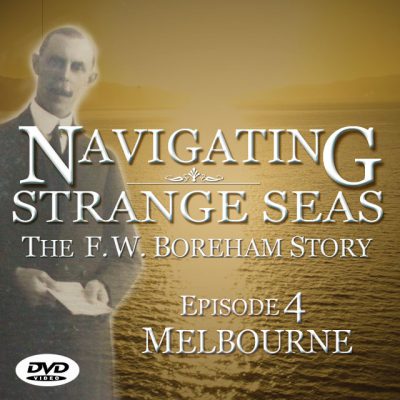
NAVIGATING STRANGE SEAS, The Dr. F.W. Boreham Story, Episode 4 – Melbourne (DVD)
$7.95 -
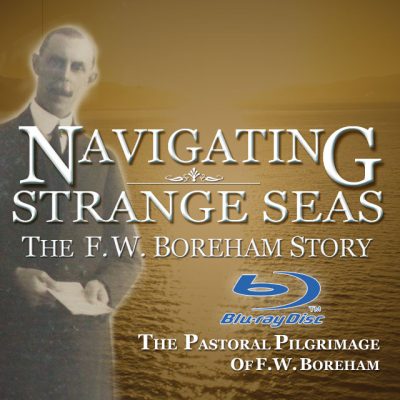
NAVIGATING STRANGE SEAS, The Pastoral Pilgrimage of Dr. F. W. Boreham – Blu ray Disc
$9.95


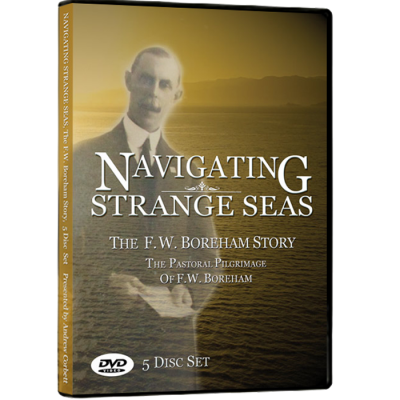
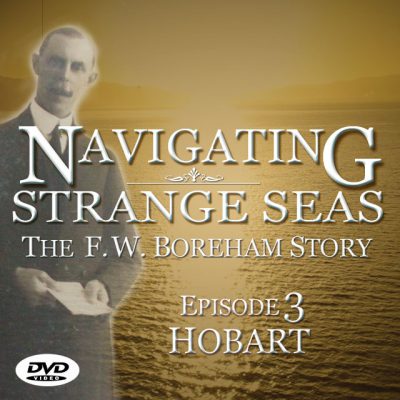
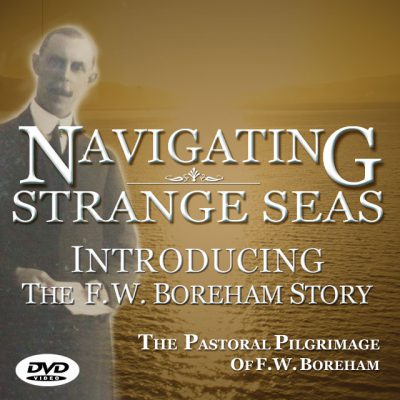
Wonderful sketch of a troubled, yet great, man and Christian. “There Is a Fountain Filled With Blood” is one of our finest hymns.
What an absolute wonderful read and encouragement for all and outcasts, for me. This reafirmed my desire to share works now of old, highly affective on thought and experience. The word to the Romans brings all hope to every era.